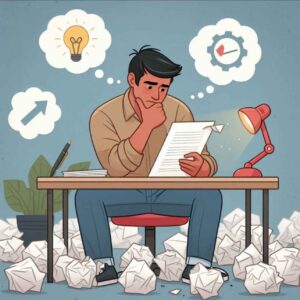Welcome Blessings!
(Tap 🔽 to see more topics!)


Growth is rarely a straight path. It’s more like a winding road that loops back, takes unexpected turns, and sometimes even stalls. But it’s all part of the process. Personal growth, in particular, requires patience, time, and something that’s often overlooked but incredibly powerful… self-reflection. It is like hitting the reset button in your busy day to look in the mirror. Not the one where you check your physical appearance, but the one that lets you check your inner self. It’s an opportunity to understand your choices, actions, and reactions. And while we may not always want to face the things we uncover, doing so is essential to becoming the best version of ourselves.
Today’s article will discuss why self-reflection is key to personal growth and how it helps unlock your full potential. We will also share examples of individuals who’ve harnessed this tool to push themselves to new heights. Think of this as your roadmap to self-discovery and transformation.
Self-reflection is the first step toward understanding who you are. It is your blueprint. When you take time to reflect, you’re not just recalling events. You’re observing the way your thoughts, emotions, and actions come together. You start to notice patterns in your behavior—why you react a sure way to stress or what makes you feel joy. The more you reflect, the more precise the picture becomes. It’s like holding up a magnifying glass to your life and noticing details you might have missed. You begin to understand your triggers, your values, and your desires on a deeper level.
Consider Maya Angelou. Her life wasn’t without struggle, but she was a master of self-reflection. She wrote about her pain, triumphs, and lessons through poetry and memoirs. Angelou often used writing as a mirror for herself. Her way of working through the chaos of life. It helped her maintain clarity and stay focused on what mattered most.
Take 10-15 minutes each evening to reflect on your day. Ask yourself: What went well today? What could have been better? How did I feel in different situations? This simple habit can uncover profound insights into your behaviors and emotional responses.
Mistakes are inevitable. Whether we like them or not. But instead of running from them or brushing them under the rug, self-reflection encourages us to sit with them. Think of failure as a teacher. By reflecting on what went wrong, you can learn from your mistakes and use those lessons to move forward with greater wisdom.
Remember Thomas Edison? Before he invented the lightbulb, he faced countless failures. But rather than being discouraged, he famously said, “I have not failed. I’ve just found 10,000 ways that won’t work.” That mindset came from his habit of self-reflection. Each failure was an opportunity for growth and refinement until he found what worked.

Next time something doesn’t go as planned, step back. What can you learn from this? What will you do differently next time? With regular reflection, you’ll notice fewer repeat mistakes and more opportunities to grow.
Without self-reflection, it’s easy to set goals that aren’t aligned with your true desires. You might put them because society tells you that’s what you should want or because someone else’s dream looks shiny and appealing. However, it allows you to reassess your goals based on what truly matters.
When you regularly reflect on where you are and where you want to go, you can realign your goals. You can check if your actions match your values and ensure your aspirations are authentic, not just external expectations. It allows you to set goals that aren’t just about success or recognition but about fulfillment.
Take Oprah Winfrey, for example. She frequently reflects on her purpose in life. By assessing her actions, she can constantly steer herself toward her larger vision: helping others, empowering people, and making a real impact. Regularly reflecting ensures her goals stay true to her values, not just the latest trend or business opportunity.

Spend time evaluating your personal and professional goals. Are they in alignment with your values? Are they genuinely connected to your goal, or does outside pressure influence them? Reflecting helps you stay true to your path.
In a world filled with constant distractions and noise, it’s easy to become overwhelmed. The pressure to keep up can sometimes feel like a storm you can’t escape. But self-reflection is an anchor in the middle of that storm, helping you regain your mental balance and clarity.
Arianna Huffington, founder of The Huffington Post, has spoken about the importance of self-reflection in maintaining mental health. She credits much of her success to moments of self-reflection, meditation, and mindfulness, all of which help her center herself and reduce stress.
Reflecting on your thoughts and emotions can help you recover from the noise, gain perspective, and respond to situations more calmly and intentionally. It’s like cleaning out the mental clutter so you can focus on what truly matters.
Try incorporating mindfulness techniques into your reflection process. Spend a few minutes each day focusing on your breath or practicing meditation. When you’re grounded in the present moment, it becomes easier to manage stress.
When we make decisions on the fly, they tend to be impulsive and often lead to regret. Self-reflection allows us to evaluate our past decisions and learn from them. It’s like a mirror that reflects our choices, allowing us to spot patterns in our decision-making process.
Take Steve Jobs, for example. Before making any significant decisions, Jobs would take long walks to reflect, which gave him time to step away from the frenzy of work and gain perspective. He never rushed but always aligned with his larger vision. Incorporating self-reflection into your decision-making process, you can make better, more thoughtful choices that align with your long-term goals.

Before making a big decision, pause and reflect. What are the possible outcomes? How does this decision align with your values and long-term goals? A moment of reflection can help you choose with greater confidence.
Emotional intelligence (EQ) is the ability to recognize, understand, and manage one’s emotions and those of others. Self-reflection is a crucial tool in developing this skill. By regularly reflecting on one’s emotional responses to situations, one gains insight into one’s emotional triggers and reactions.
Think about a time when you felt angry or upset. Instead of reacting impulsively, self-reflection allows you to step back and ask yourself, “Why do I feel this way?” With practice, you can regulate your emotions and respond more balancedly.
After emotionally charged moments, take a few minutes to reflect on why you reacted the way you did. This practice helps you develop greater emotional awareness, leading to more constructive responses in the future.
We can be our worst critics, constantly judging ourselves for our mistakes, flaws, or missed opportunities. But this teaches us to approach ourselves with kindness and understanding. It allows us to see our imperfections without judgment and helps us recognize that growth is a process. This process encourages you to view setbacks as learning experiences instead of failures. You learn to treat yourself with the compassion you’d offer a friend going through a tough time.
When reflecting, try to be gentle with yourself. Instead of focusing on your shortcomings, acknowledge your progress and efforts. Self-compassion is essential to long-term growth.
Creativity isn’t just about having a great idea. It’s about allowing space for those ideas to evolve. Self-reflection provides that space by helping you connect the dots between your experiences, thoughts, and emotions. This connection often sparks creativity, leading to new insights and innovative ideas.
Albert Einstein famously said, “Creativity is intelligence having fun.” Self-reflection allows your mind to wander, consider different perspectives, and generate ideas you might have missed.
Incorporate reflective journaling into your creative process. Write freely about your thoughts, and see where your reflections take you. You’ll be amazed at the ideas that emerge!
Think of checking in with yourself – reflecting – not as a chore, but more like a bit of heart-to-heart you have with you every day. It’s like taking a moment to see how things are going inside. This simple habit can help you better understand yourself, like figuring out why that thing bothered you or what made you happy. It’s also a helpful way to learn from our little oops moments, making setting goals that feel right much easier. Plus, taking that pause can seriously dial down the stress – who doesn’t want that? Making this a regular thing can open you up to growing in ways you might not even imagine and help you feel more connected to yourself.
So, why not try it? Take a little slice of your day to pause, think things over, and move forward more purposefully. It could be the key to unlocking all the awesome stuff inside you. I hope this gave you some food for thought and a little nudge to try it out. What are your thoughts on this? Have you found reflection helpful in your own life? Share your experiences in the comments below – we’d love to hear about them! Voila! Until next time!